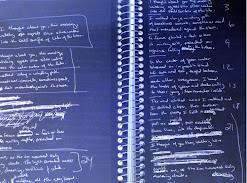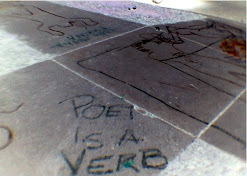I was very fortunate to be able to interview Tao Lin via Gmail last week, in preparation for our PBC discussion of his book of poetry, you are a little bit happier than i am. Below is the interview. Enjoy!
What or who are your main influences on your poetry?
My main influences for the poetry book you read are the people I wrote about in the book, the "you" in many of the poems. I am interested in all those people, the things they've said or done, and I think about them when I'm alone and not thinking about myself.
How would you describe your dominant aesthetic in writing poetry? Do you have primarily visual goals, thematic goals, oral/aural goals, or a combination?
My dominant aesthetic in writing poetry is that I try to write what I want to read. It changes a lot, what I want to read. There are a lot of things I don't want to read though, that doesn't change as much. I don't want to read poetry that will make a 12-year-old feel stupid. I don't want to read poetry that will make someone who works at Kmart and has never read poetry feel stupid. I don't want to read poetry that has the power to make anyone feel stupid.
Your poetry is quite a leap forward from the "establishment" type of poetry, thematically and aesthetically. You can tell that you are a member of our generation, when you read your work. How does this affect you commercially?
That was a funny question, I stared at it reading with a neutral facial expression and then laughed a little at the end. I don't think it has been "exploited" yet at all that the poetry book you read could be marketed as a "voice of a generation" or something book. If someone involved in the book had the ambition or something to do that I think it could sell a lot of copies and a lot of teenagers and college kids would read it. If MTV released the book I think they could sell a lot of copies. Still, it has sold a lot of copies I think for poetry. I think it has sold something like 1200 copies or something, and it seems to be selling more now than when it came out.
I think the "establishment" type of poetry you talk about is also written by "members of our generation." I mean 24-year-olds are not all writing poetry that is like the poetry in my poetry book. So it is not a generational thing I think. I don't think anything at all is a generational thing. There is a percentage of humans that thinks a certain way, like 2% are really alienated, 18% appreciate humans that are really alienated, and 80% appreciate sports, or something, and those numbers stay constant maybe no matter what year you were born in. Generational things may change those numbers a little but not much. These numbers are not based on any facts.
I found myself thinking a lot about all the personification in your poems. Food thanks you for eating it, literary magazines beg you to buy them. How do these characters occur to you?
I think it first occurred to me either through my mom, dad, reading Joy Williams, or my friend who does that a lot, talks about inanimate things like they have feelings and thoughts. When I was five or something if I saw a stuffed animal with its face covered by another stuffed animal's ass or something I would move the stuffed animal so its face would not be covered. Then I would feel better. Thinking like this makes me feel better because it makes life less significant. If a stuffed animal endures like 5000 days of having its face crushed by a box or something then I can endure not getting text messaged back by someone I like. A stuffed animal sits there, it doesn't move, what if it's alive and conscious but just really enlightened, and so chooses to go against consciousness and therefore not have to "deal with" existential despair, the "burden" of having to choose in a universe that does not tell us what to choose? This is comforting to me and exciting.
I'm also really interested in your book's overall tone. The language seems very ironic, a kind of wry sense of humor. Do you find yourself ever wanting to commit to some flowery, purplish prose? How do you marry the tone to your subject matter?
My story-collection, BED, has "flowery, purplish prose," I think. It is still "ironic" and "wry" though. I don't know how I marry the tone to my subject matter. I usually want to write in a tone that is not angry, bitter, or desperate. I feel desperation and anger and bitterness but I feel them for like 5 minutes. Most of the time I feel something else. That is the tone I try to write in for most of my things. For me to get the tone like that it takes a lot of editing.
It is like when I went fishing with my family when I was small. One day a hammerhead shark jumped out of the water and ate half of a bluefish that someone caught. That only happened once. It isn't how it always is. To get like how it usually is when someone goes fishing I would need to go fishing with my family like one hundred days in a row.
You use a lot of references to the business of writing in your poetry: book awards, rejections, literary agents, et al. Some poets ban this type of subject from their writing, as if it doesn't exist. Why did you first start including it in your writing?
I think maybe 5% of the words in the book reference the business of writing. I didn't think any more about "why I should include it" than about why I should include the word "the" or "and" or something. So if I included it it was probably because it was something I wanted to read. Because I try to write what I want to read.
In college in a writing workshop one person said I was post-modern. I think they said that because I included "Washington Square Park" in one of my stories or something. I asked them what they meant by post-modern. I asked if they could name some authors and they couldn't and then they said Dave Eggers.
You write fiction, poetry, and a blog and you publish in all three forms. What's your process like? When do you sleep?
If I am not working the next day I go to sleep around 6 a.m. That is my natural time for feeling sleepy I think. On Christmas I tried to sleep the entire day because the library was closed and everything else was also closed. I dislike holidays. I slept from 8:30 a.m. to 10:30 p.m. on Christmas. Then I planned that I would just not sleep that night and go to the library at 7 a.m. when it opened and then go to work at 10 p.m. I work in a restaurant.
My process for poetry is I usually have a file of poetry and I work on it if I feel like doing poetry. Then I save the file and email it to myself. For my next novel I have a file it's in and I usually have it open and work on it every day mostly. 95% of the time on the novel is spent working on parts I've already worked on many times before, I change some words or try moving the words in the sentences around or try moving the sentences around or deleting a word or a sentence. Then for the other 5% of the time I will write more, add to the novel, or I will look at the entire novel and think about if I want to delete large sections or move some things around.
For my blog I will be on Gmail chat and say something to someone. Then I will say, "I should blog that." Then the other person will say, "You should." Then I try it. If it's stupid I save it as a draft, if it is exciting I publish it.
You have a couple of epic length poems in your book. How does the writing and revision process differ between poems like "i am unemployed" and "i want to pour orange juice on my face"?
I dislike the longest poem, the one about poodles. I worked on that poem the most out of any of the other poems in the book. It doesn't fit the tone of the book I don't think.
For "i want to pour orange juice on my face" I wrote it and then deleted words that I could delete and still have it have the same meaning. For "i am unemployed" I think I did the same thing. The one I worked on a lot was the really long one that has poodles i it. For that one I had it in a file and I worked on it every day for like 20 days or something.
A lot of your poems seem to center around these "i want" fantasies? Do you keep track of all the weird and mundane things you want or do you have a larger process?
I just thought about what I wanted and typed it. There is always something I want. Sometimes I say I don't want anything but that's being ironic most of the time I think. Really I am saying "I wish I didn't want anything." So if I want to write a poem about what I want I just think about my brain and what it wants and I type that.
Monday, December 31, 2007
Poetry Book Club: Interview with Tao Lin
Posted by Jessica at 6:03 PM
Labels: famous writers, poetry book club, writing habit
Subscribe to:
Post Comments (Atom)



3 Comments:
Very nice.
Brandon
"There are a lot of things I don't want to read though, that doesn't change as much. I don't want to read poetry that will make a 12-year-old feel stupid. I don't want to read poetry that will make someone who works at Kmart and has never read poetry feel stupid. I don't want to read poetry that has the power to make anyone feel stupid."
i think that's wrong now, some of the poetry i like might make some people feel stupid
I would agree that some of the poetry I like might make other feel stupid. In a recent past life, I taught Literature at a culinary school and a lot of the stuff I taught (accessible as I thought it was) sometimes made my students feel stupid.
I think with some poetry there is an element of stretching your intellect in order to learn something new. And that's not a bad thing, although it is painful and makes people feel dumb in the process.
I used to teach 13 ways to look at a blackbird to my students, one of my favorite poems, and they "didn't get it" all the time. That was always the first response. But I grabbed dictionaries and made them puzzle through it. Some of them grew to appreciate the poem after struggling with it. (Most still hated it, though.)
There's nothing wrong with struggling with what you read. It's part of the process.
Post a Comment